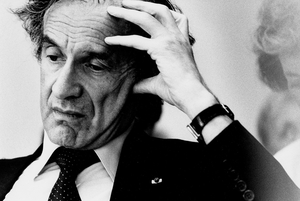Elie Wiesel - child survivor of Auschwitz, renowned author, Nobel Peace Prize laureate and conscience of our time - has died. We shall not see his like again. He now belongs to the ages. I had to share my feelings at this sad moment with you all...
The Book of Joshua tells us that, “…the Lord delivered up the Amorites… and he said Sun, stand thou still upon Gibeon; …And the sun stood still at mid-day, until the people avenged themselves upon their enemies.” I used those words in my eulogy at my father's funeral.
Some seventy years ago, Elie Wiesel was a young man with no name, no hope, no future and was known only by a tattooed number. He came out of a charnel house of darkness and malediction. A world, in his words, “… of silent screams.” A world of eternal night.

My first contact with Elie Wiesel came in 1975 when I organized an ecumenical Symposium on the Holocaust at McGill. We extended an invitation to him to join Prof. Raul Hilberg, Dr. Isaiah Trunk and Father Stephen Valiquette amongst others. Unfortunately his schedule did not allow him to attend.
Through the power of his passion and his prose, he forced us to see that every day was our last day. Our last chance to marshal our strength, a strength that if deserted meant that all would be lost in us. He was the leader of the only kind of crusade worth fighting for. The hopeless kind. And he never forsook it. He stayed the course.
He challenged us to judge ourselves and see that against us stood purveyors of false pieties who called themselves successors of man. His conscience called us to reject those pieties and to realize that the work of their destruction would put an end to mankind’s transcendent yearning for redemptive change and with it the end of morality in the human condition.
Our duty to his life is to continue to bear testament to the venomous fury that nearly snuffed it out. A venomous fury that scorched the earth and miraculously flung this one brave ember back upon humanity so that its spark could rise to a flame that might still light the path to our own redemption. For mankind has not crossed the Jordan. Not even close.
We have a duty to continue his work and ensure evil never triumphs, for in that surety rests our only claim to the restitution of our birthright as civilized people. As we continue our work for the victory of universal commonality over narcissistic particularity we need to remember the lesson of the Shoah. Not all the victims were Jews. But all Jews were victims. Elie Wiesel challenged us - every day and in every way - to make sure that "Never Again" meant more than just empty words.
Yitgadal veyitkadash, Shmay Rabba.

























Commentaires
Veuillez vous connecter pour poster des commentaires.